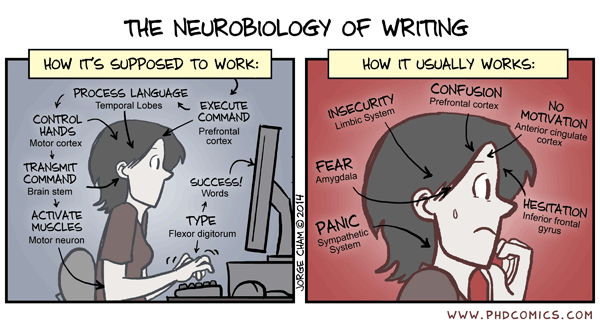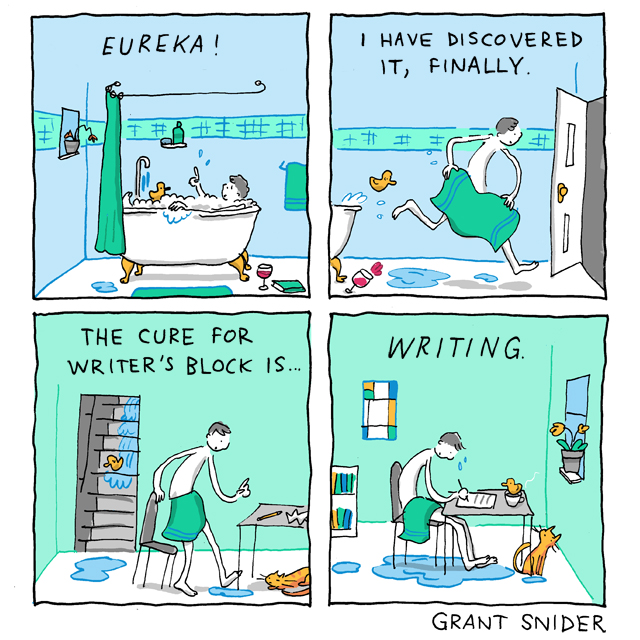Hey, want to listen to a horror story?
It is 3 hours past your deadline. The sharp white glare of a blank word document is staring back at you. In the background, your browser has a dozen tabs open because your research led you down a Wikipedia rabbit hole. You are out of coffee. The clock is ticking away. Your writer’s block is winning. The walls are closing in.
Writer’s block is every writer’s worst nightmare. Whether you’re a fiction writer, a blogger, a student, or a SaaS writer like me, you know the horrors of it all.
So, why do we keep falling into this trap? Is there a way to avoid it? Can you overcome it?
The Science Behind Writer’s Block
In 1950, Edmund Bergler decided to research Writers’ Block. He called it a neurotic disease.
The next time someone says, “Oh, you are lazy; there is nothing such as writer’s block,” send them this. (Source: DOES “WRITER’S BLOCK” EXIST? )
A Yale survey in the late 70s confirmed that writers who suffered from this ‘disease’ were unhappy. They experienced high levels of stress, anxiety, and disappointment. In summary, negative emotions were found to inhibit a writer’s creative flow. (This sort of goes against the tormented writer trope.)
“But why should I care about these studies? I have an article to write! Do I need to go to therapy now?”
No, not necessarily, although it may help. But, my takeaway from these studies is this: there is a clear connection between how we feel and how we write.
To help you (and myself in the process), here are some ways in which writer’s block may show up, what may be the reason, and what you can do about it.

How to Overcome the Dreaded Writer’s Block: SaaS Writers Edition
#1 I just can’t seem to get it right!
Why this happens: Self-criticism
Do this instead:
Constructive self-criticism is good. But, catch yourself when you fall into the spiral of writing two lines and then deleting them – it will get you nowhere!
The key is to trust the process. Do not expect every sentence to be immaculate. Yes, your first paragraph wasn’t that great, but keep writing. Your thoughts will flow as you dive in. Once you have a solid second or third paragraph, you will know exactly what you need to do to improve the first one. In the end, you will have produced highly effective, original content you can share proudly.
#2 I can write better than this
Why this happens: Perfectionism
Do this instead:
No one is perfect. Especially not writers.
Allow yourself to write a less-than-perfect copy. The chances are you are comparing yourself to your previous work and feeling like you’re losing the ‘spark.’ And so, you never get started!
The truth is your need for perfectionism is clouding everything. What you should understand is writers seldom get it perfect the first time. But it is important to write that first draft anyway. And once you’re done, there is always time to revise it. So, write away, and refine later. This is how you can create better content.
Here is how Nobel Laureate Ernest Hemmingway put it: Write drunk, edit sober.
#3 I am afraid the reader won’t like this!
Why this happens: Fear of rejection
Do this instead
Expressing yourself to a large audience can be scary. (So many of us have a fear of public speaking!) And the thought of dozens of folks reading your work can be equally terrifying. But you cannot please everyone, can you?
There will always be people who won’t like your article, and that is okay.
John Steinbeck, the author of “Of Mice and Men,” advised:
Forget your generalized audience. In the first place, the nameless, faceless audience will scare you to death, and in the second place, unlike the theatre, it doesn’t exist. In writing, your audience is one single reader. I have found that sometimes it helps to pick out one person — a real person you know or an imagined person and write to that one.
John Steinbeck
For SaaS writers, this is easy to achieve. You already have a buyer’s persona to write for. So, why not speak directly to them instead of everyone else?
#4 I am bored, I have no ideas, and I don’t care about this!
Why this happens: You may be bored.
Do this instead:
Boredom is real.
Often, we have to write about topics that do not interest us. And when you have access to Netflix, YouTube, Instagram, and other distractors, sitting down to write can feel impossible. So many of us promise ourselves, “I am just taking a quick break to check my feed” or “Just one episode.” And soon, we lose four hours of our day and get nothing done.
Learn your lesson: Distracting yourself with mindless activity won’t inspire you to write.
And then, there are some writers who claim they get inspiration from traveling, journaling, playing sports, or <insert any other activity apart from actually writing your pending article>
Let us be honest. These activities take time, derail you further, and sap your energy.
What you can do is do something which is both quick and mindful, such as taking a short walk or deep breathing, and then come back.
Another trick is changing your inner monologue and switching from boredom to curiosity. This helps you bring alive even the most boring topics and do it well. For example, if you’re thinking, “Writing about marketing attribution is so boring,” think, “I wonder what marketing attribution is about; let us find out.”
#5 My editor wants this today, but my writer’s block won’t let me!
Why this happens: The external pressure is stressing you out
Do this instead:
If you are a professional writer, you will always have a deadline. While some writers get supercharged and perform best when they are nearing the deadline, others are paralyzed by panic. They beat themselves up for procrastinating, vow never to do this again, and then repeat the cycle.
Okay, breathe. If you have read the tips above, you have all the tools to prevent procrastination and manage your time better. But, if you have been given an article to write on short notice, you can still manage it.
First off, request extra time. If possible, delegate your other responsibilities to someone else or schedule them for a later date. If this is a recurring problem, you may benefit from a short break from work. But don’t let the pressure rob you of the joy of writing!
Write Away!
The next time you find yourself backed away into a corner, you will know what to do! So stop worrying and face writer’s block head-on.
A word of caution: Do not force your writer’s block to go away. Giving yourself some tough love and telling writers to ‘do it anyway!’ is bad advice. Instead, process how you feel. Soon, you will replace your writer’s block with a much more desirable state – writer’s flow.
Do you have any life hacks for writer’s block? Share them in the comments!




3 thoughts on “How to Overcome Writer’s Block: A Guide for Marketers”